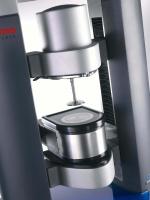The Rheonaut Module by Thermo Fisher Scientific, when used with the HAAKE MARS rheometer platform, helps users understand the causes of rheological properties on a microscopic level. Dynamic rheometery and FT-IR spectroscopy can be employed simultaneously to monitor a structure development during the reactive processing of a sample and to detect interactions in contrast when used in parallel. This enables customers to optimise their products by adpating formulations more quickly.
Using a rheometer it’s possible to study the steady state and time-dependent viscoelastic properties of a material as a function of stress and/or strain. The viscoelastic properties of a material depend on the structure, however; especially the structural changes of the material on the molecular level. Infrared spectroscopy is an excellent tool for determining the identity and quantities of molecules in a sample. The Rheonaut provides both physical and chemical information on a sample simultaneously using one instrument. This allows a comparison of chemical informaiton with rheological properties. The Rheonaut operates in the mid-infrared spectral range since all fundamental absorption bans of a sample are typically found between 400-4000cm-1 (2.5 – 25 μm). This covers the so-called fingerprint region, which is generally accepted as unique for each molecule.
The Rheonaut is a compact module for Thermo Scientific HAAKE MARS that features:
• Simultaneous rheology and FT-IR spectra measurements
• ATR (attenuarted total reflection) principle
• Anlaysis of structural changes under shear/deformation
• Extensive investigation of thermal/UV curing reactions
Infrared Spectroscopy is capable of identifying the nature of a products molecular structures and transformations. The installation of the FT-IR Spectrometer option to the HAAKE MARS allows the researcher to discover another level of detail in the comprehension of rheological applications.

